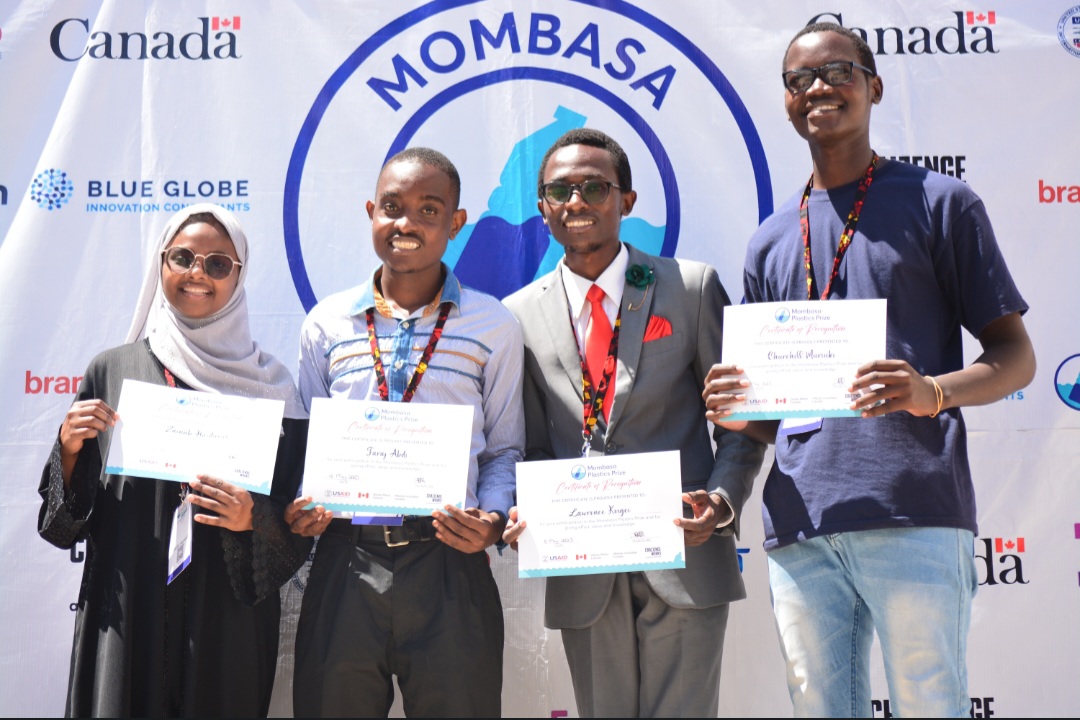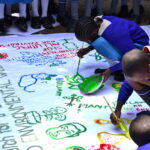Challenge Works has announced winning teams of the Mombasa Plastics Prize Awards and Celebration.
The awards, which showcased the most effective solutions to tackle Mombasa’s marine plastics problem, were the culmination of a six-month initiative funded by USAID and Global Affairs Canada.
Designed by Challenge Works, the prize sought to inspire and up-skill young leaders, especially women, aged 18-25, to develop creative interventions that encourage individuals and communities in Mombasa to address marine plastic pollution in informal settlements.
Representing the Governor of Mombasa, Kenneth Amanbai, CECM Public Service Administration, Youth, Gender , Sports and Social Services said,, “We are proud to lead our country in embracing innovative solutions from young people that can help us reach our nation’s Sustainable Development Goal 11: making cities and human settlements inclusive, safe, resilient and sustainable.”
He added, “I commend Challenge Works for its innovative design of prizes that involve not only the youth but the entire ecosystem in solving the County’s most pressing problems. With these creative ideas that our young people have developed over the past few months, Mombasa is well on its way to achieving its Green Cities goals as outlined in our County Solid Waste Management policy.”
At the national level, the State Department of Environment and Climate Change has invested heavily in both policies and law enforcement to win the fight against plastic pollution. In addition to banning the manufacturing, retailing, distribution and importation of plastic carrier and flat bags for commercial or household use in 2017, the Ministry also prohibited their use in protected areas in 2019.
Reiterating the country’s commitment to curbing the plastics menace, Mr David Ong’are, Director of Compliance and Enforcement at the National Environmental Management Association (NEMA)who represented the Director General said, “Plastics are the largest, most harmful and most persistent fraction of marine litter, accounting for at least 85 pc of total marine waste.”
He added, “Mismanaged waste aggravates the triple climate change crisis; nature and biodiversity loss, and pollution.” The Ministry of Environment has therefore invested driving the country’s transition to a green growth and circular economy, which means focusing efforts on recycling, reuse, and reducing plastic waste. Two such efforts are the Green Economy Strategy and Implementation Plan (2016-2030) and The Sustainable Waste Management Act 2022.”
“With these investments, Kenya has strengthened its international reputation as a good steward of the environment. We are excited to see Mombasa County upholding these commitments against marine plastics mismanagement,” said David.
Anna Ghnouly, USAID Kenya and East Africa Environment Office said: “Today’s event and the success of the Mombasa Plastics Prize is a testament to the incredible youth involved. Because of this success, and the brilliant innovation and energy of each participant, I am honored to announce today that USAID Kenya will be launching a business accelerator program to help them take their ideas to the next level, and continue leading in the fight against ocean plastic pollution.”
Jonathan Slater, International Development Director of Challenge Works, said: “We are incredibly grateful to all the partners that made the Mombasa Plastics Prize a success – the initiative provided a unique opportunity to create lasting change and forge a sustainable, plastic-free future for the County.”
The prize was built upon the Afri-Plastics Challenge, a continent-wide plastics innovation challenge worth over KES 700 Million (£4.1M), which saw five Kenyan startups out of the total nine startups scoop over KES 340 Million (£2M) to scale their ideas at the inaugural Afri-Plastics Summit & Awards ceremony. The event was presided over by PS Environment, Festus Ngeno on 17th March 2023.
“We thank the Mombasa Plastics Prize judging panel, coaches and mentors for their valuable input. They include experts from different fields including plastic waste management, social entrepreneurship, innovation, youth skills development, sustainability and the circular economy,” Slater said.





